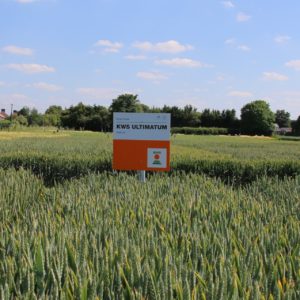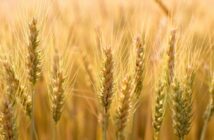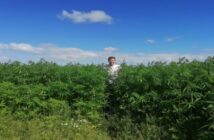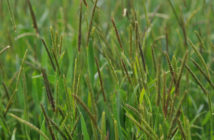A top performing soft Group 4 winter wheat, a super clean Group 2 all-rounder and three spring-sown milling varieties are great examples of KWS’ drive to add diversity and opportunity to UK crop production, says KWS UK country manager Will Compson.
“The total number of wheat varieties we have on the 2023/24 AHDB Recommended List stands at 13 and it is likely around 40% of the wheat harvested in 2023 will be a KWS variety of one type or another.
“Our varieties span all four production groups be it premium specification Group 1 milling wheats like KWS Zyatt, varieties with high untreated yields like Group 2 KWS Extase, Group 3 biscuit making options or outright barn fillers like Group 4 KWS Dawsum.
“Initiatives like Sowing for Peak Performance (SPP) continue to deliver new high performing varieties to help growers meet the increasing challenges of the future with a focus very much on developing genetics that align with improved sustainability and low carbon objectives.
“Our additions to the 2023/24 RL are very much part of this trajectory, combining high in-field performance with simplified crop management allowing growers to deliver the highest yields to a range of end-markets.”
Super-stiff strawed with early sowing and distilling options
KWS UK wheat breeder Mark Dodds says all five KWS RL wheat additions add something new to the current range of UK cropping options.
“Group 4 soft variety KWS Zealum, for example, is a great example of a resilient wheat that delivers strong field performance with excellent yield potential for growers.
“Recommended for the North of the country, KWS Zealum has an average yield of 102% in this region which rises to over 106% when it is drilled before September 25th.
“This is an important characteristic for Northern growers, most of whom would complete the vast majority of their wheat sowing before this date.
“Its medium height with very stiff straw makes it ideally suited to the Northern climate and the tough growing conditions from Yorkshire up through Scotland.
“In addition, evaluations by SWRI have shown that KWS Zealum is ideally placed to serve the 400,000 tonne distilling market in that region.
”As a non-Cougar addition to the soft market, KWS Zealum’s field performance is also bolstered by a strong disease packaging including a 9 for yellow rust, OWBM resistance and excellent Fusarium resistance.
“Of most interest to growers in the north will be Zealum’s strong scores for mildew (7) and sprouting resistance [6] It also has good resistance to Mildew and Fusarium with 7s for both.”
New Group 2 has best resistance to sprouting of the breadmakers

KSW Ultimatum
KWS Ultimatum brings the high untreated yield performance growers have come to expect from the KWS Group 2 stable along with excellent grain and field performance, Mark Dodds says.
“KWS Ultimatum achieves a commendable yield of 101% of controls for the whole of the UK, fractionally behind KWS Extase, but this rises to 103% for the North.
“It delivers great performance in the second wheat spot, where 60% of milling wheats and 40% of wheat overall is grown, achieving 102% of controls and it performs equally well on heavy and light soils.
“It’s got an excellent untreated yield of 93% of controls, just behind the gold standard KWS Extase, supported by an excellent disease package including a 9 for yellow rust and a 6 for brown rust giving it a better combination of rust resistances than similar varieties.
“Eyespot and Fusarium resistance at 5 and 7 respectively are extremely strong too with a 7 for Mildew adding to its appeal for Northern growers.
“Quality wise, KWS Ultimatum has the best resistance to sprouting in the breadmaking sector which is very important to growers aiming for premium specifications and those in tougher microclimates.
“The variety delivers a protein content of 12.3%, a Hagberg Falling Number (HFN) of 287, a specific weight of 79.6 kg/hl and has been rated as Group 2 by the UK Flour Millers with the added bonus of UKP Export status.”
Spring sown milling varieties set new benchmarks
Turning to the Spring sown wheat varieties added to the 2023/24 RL, KWS Harsum is a Group 1 variety in the same mould as existing RL variety KWS Ladum, whilst KWS Alicium and KWS Lightum are exciting new Group 2 options, explains KWS Spring wheat breeder Dr. Reiner Bothe.
“KWS Harsum becomes the highest yielding Spring sown Group 1 variety on the RL at 102% of control just fractionally ahead of KWS Ladum and some 7% ahead of the next variety in the class.
“Rated by the UK Flour millers as a Group 1 thanks to it’s baking performance over the years in trial, KWS Harsum’s good protein content is complimented by a high HFN and the best specific weight in the Group 1 spring sector at 78.3 kg/hl.
”With 7s for mildew, yellow rust and Septoria plus OWBM resistance, the variety has one of the best agronomic packages in its class.
“Group 2 KWS Alicium couples outstanding yields with fabulous grain quality, breadmaking performance and OWBM resistance and represents a new type of genetics for the spring wheat milling sector thanks to its German parentage.
“With a treated yield of 105% it’s a real high performer with grain quality to match. A 13.3% protein content, HFN of 346 and specific weight of 80.3 kg/hl really do set a new benchmark for its class.
“Solid agronomic performance with an 8 for mildew resistance and a 7 for Septoria rounds out the package making it one of the most complete added-value Spring sown options there is.”
KWS Lightum is another Spring-sown Group 2 variety which offers growers high yields and excellent grain featuring a protein content of 13.4%, HFN of 325 and specific weight of 78.4, he points out.
“Like its new KWS stablemates, Lightum also has OWBM resistance coupled with excellent disease resistance including an 8 for Mildew resistance, 7 for Brown rust and 6 for Septoria contributing to a strong disease package.”




